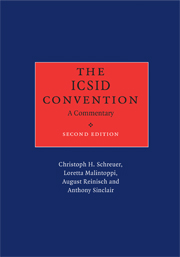Book contents
- Frontmatter
- Contents
- Foreword by Professor Sir Elihu Lauterpacht, CBE, QC
- Authors' preface to the second edition
- Table of cases
- List of abbreviations
- Text of the ICSID Convention
- Procedural calendar
- PREAMBLE
- CHAPTER I International Centre for Settlement of Investment Disputes
- CHAPTER II Jurisdiction of the Centre
- CHAPTER III Conciliation
- Article 28 Request for Conciliation
- Article 29 Composition of Commission
- Article 30 Appointment by Chairman
- Article 31 Qualities of Conciliators
- Article 32 Decision on Jurisdiction
- Article 33 Rules on Procedure
- Article 34 Conciliation Proceedings and Report
- Article 35 Non-Invocation in Subsequent Proceedings
- CHAPTER IV Arbitration
- CHAPTER V Replacement and Disqualification of Conciliators and Arbitrators
- CHAPTER VI Cost of Proceedings
- CHAPTER VII Place of Proceedings
- CHAPTER VIII Disputes between Contracting States
- CHAPTER IX Amendment
- CHAPTER X Final Provisions
- Final Clause
- Consolidated bibliography
- Index by article
- Index by subject
Article 29 - Composition of Commission
from CHAPTER III - Conciliation
Published online by Cambridge University Press: 07 September 2010
- Frontmatter
- Contents
- Foreword by Professor Sir Elihu Lauterpacht, CBE, QC
- Authors' preface to the second edition
- Table of cases
- List of abbreviations
- Text of the ICSID Convention
- Procedural calendar
- PREAMBLE
- CHAPTER I International Centre for Settlement of Investment Disputes
- CHAPTER II Jurisdiction of the Centre
- CHAPTER III Conciliation
- Article 28 Request for Conciliation
- Article 29 Composition of Commission
- Article 30 Appointment by Chairman
- Article 31 Qualities of Conciliators
- Article 32 Decision on Jurisdiction
- Article 33 Rules on Procedure
- Article 34 Conciliation Proceedings and Report
- Article 35 Non-Invocation in Subsequent Proceedings
- CHAPTER IV Arbitration
- CHAPTER V Replacement and Disqualification of Conciliators and Arbitrators
- CHAPTER VI Cost of Proceedings
- CHAPTER VII Place of Proceedings
- CHAPTER VIII Disputes between Contracting States
- CHAPTER IX Amendment
- CHAPTER X Final Provisions
- Final Clause
- Consolidated bibliography
- Index by article
- Index by subject
Summary
Art. 29 is the first of three Articles in Section 2 of Chapter III on Conciliation. Section 2 is entitled “Constitution of the Conciliation Commission”. Art. 29 is the basic provision on the constitution of a conciliation commission. Art. 30 deals with the appointment of conciliators by the Chairman in default of the parties. Art. 31 deals with the appointment of conciliators who are or are not designated to the Panel of Conciliators under Arts. 12–16. A comparison with the parallel Section 2 of the Convention's Chapter IV (Arbitration) reveals that the rules on the constitution of a conciliation commission do not contain a provision that corresponds to Art. 39 dealing with the nationality requirements for arbitrators (see para. 5 infra).
Art. 29 is substantively identical to Art. 37, its counterpart in the Chapter on Arbitration. The only difference is the substitution of “Conciliation Commission” and “Commission” for “Arbitral Tribunal” and “Tribunal” and “conciliator(s)” for “arbitrator(s)” as well as the reference to Art. 28 rather than to Art. 36.
The drafts to Art. 29 were almost identical to the parallel drafts to Art. 37 (History, Vol. I, pp. 146, 148, 176, 178). The debates on what became Art. 29 did not lead to any differentiations in the texts (History, Vol. II, pp. 78, 152/3, 262/3, 412, 782/3, 790).
- Type
- Chapter
- Information
- The ICSID ConventionA Commentary, pp. 433 - 435Publisher: Cambridge University PressPrint publication year: 2009



